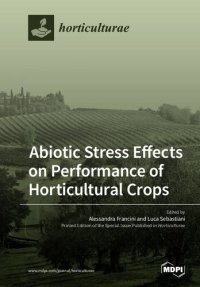
Ebook: Abiotic Stress Effects on Performance of Horticultural Crops
Horticultural crop yield and quality depend on genotype, environmental conditions, and production management. In particular, adverse environmental conditions may greatly affect crop performance, reducing crop yield by 50%–70%. Abiotic stresses such as cold, heat, drought, flooding, salinity, nutrient deficiency, and ultraviolet radiation affect multiple physiological and biochemical mechanisms in plants as they attempt to cope with the stress conditions. However, different crop species can have different sensitivities or tolerances to specific abiotic stresses. Tolerant plants may activate different strategies to adapt to or avoid the negative effect of abiotic stresses. At the physiological level, photosynthetic activity and light-use efficiency of plants may be modulated to enhance tolerance against the stress. At the biochemical level, several antioxidant systems may be activated, and many enzymes may produce stress-related metabolites to help avoid cellular damage, including compounds such as proline, glycine betaine, and amino acids. Within each crop species there is a wide variability of tolerance to abiotic stresses, and some wild relatives may carry useful traits for enhancing the tolerance to abiotic stresses in their progeny through either traditional or biotechnological breeding. The research papers and reviews presented in this book provide an update of the scientific knowledge of crop interactions with abiotic stresses.